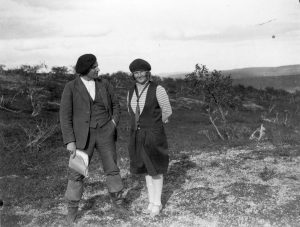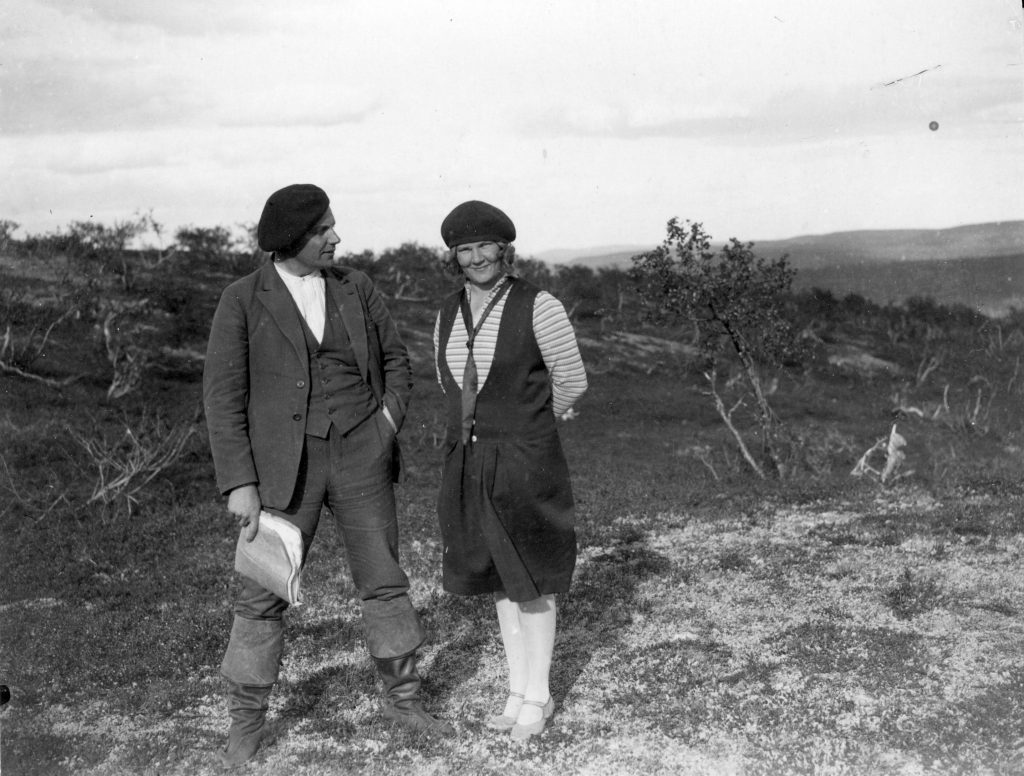Katri Viita, born Karin Elisabet Viitainoja, is one of the pioneer female screenwriters of Finland. In fact, only two female scenarists are known to have worked during the silent era: Viita, who wrote Työn sankarilaulu/A Song About the Heroism of Labour (1929) and Gerda Hintze, the scenarist of Kajastus/Mirage (1930). Viita and Hintze worked around the same time: Työn sankarilaulu was filmed during the spring and summer of 1929 whilst Kajastus went into production during the fall of 1929. Unlike Hintze, Viita also worked during the sound era. It is important to acknowledge the challenge of identifying all of the crew members of silent-era Finnish cinema. For example, only a few crew members are credited in existing original opening credits and film programmes, which were available to cinemagoers. In some cases, resources like Suomen kansallisfilmografia/The Finnish National Filmography only identify the surname of crew members (Uusitalo et al. 1996). Furthermore, it is known that women working in film sometimes used gender neutral or masculine pseudonyms (Pennanen 2016).
Karin Viitainoja was born in Helsinki in 1898 to Johan Vilhelm Viitainoja, a custodian, and Hilda Sofia Vesterinen. According to a 1975 article in Viikkosanomat, Viitainoja’s education was cut short due to financial matters. However, she was gifted both as a writer and as a painter (Tammi 53). Viitainoja’s first novel, titled Keväästä kesään, was published in 1926 under the name Katri Viita.

Kalle Kaarna and Katri Viita on the set of Työn sankarilaulu (1929). Courtesy of Kansallinen audiovisuaalinen arkisto (Kalle Kaarna: Työn sankarilaulu 1929 ©KAVI/Filmi O.Y. Kotka).
In the late 1920s, Viita approached filmmaker Kalle Kaarna about an idea for an original script (Tammi 52). She then wrote the script for Työn sankarilaulu, a melodrama directed by Kaarna for Filmi o/y Kotka, his production company. Only Viita’s name is mentioned as the screenwriter in the film’s programme, but the script itself credits both Viita and Kaarna as its authors. According to the 1975 article in Viikkosanomat, the collaboration between Viita and Kaarna worked so that she wrote the scripts, which he then fashioned into shooting scripts (Tammi 52). Interestingly, Viita was also a member of the board of Filmi o/y Kotka in 1929 and 1930, according to trade journals such as Suomen kaupparekisteri and Kauppalehden Protestilista (1929, 33; 1930, 25).
Työn sankarilaulu follows the love triangle of Margit von Stenhjelm (Kaisa Leppänen), Juhani Rauta (Urho Somersalmi), and Olli Järvelä (Einar Rinne), who grow up together at Baron von Stenhjelm’s (Kalle Kaarna) ironworks. The film is a celebration of labour and the working man, as implied by the title. Juhani, who like his father ends up working at the ironworks, and the baron’s daughter Margit are in love. However, they are unable to be together because of the difference in social class. Olli, the son of an engineer (Eero Leväluoma) working at the factory, is taken by Margit and will stop at nothing to possess her and her family’s wealth. Juhani is angered by the way the workers are treated at the ironworks. He resigns after a confrontation with Olli’s father, which has been set up by a jealous Olli. Juhani then moves to Lapland in search of gold. Margit and Olli marry, and he ends up spending the Stenhjelm family fortune. Drunken and close to bankruptcy, Olli decides to apply for a position at a mine in Lapland. It turns out that Juhani, who has risen in social class through hard work, runs the mine. He hires Olli as the engineer and thus the three childhood friends are reunited in Lapland. After a near death experience Margit confesses her love to Juhani and they kiss passionately. The scene is witnessed by Olli, who in a jealous rage attempts to kill Juhani by pushing him into the rapids. Juhani is saved by Margit and the workers of the mine. Meanwhile, Olli goes to the woods to hunt and ends up accidentally shooting himself. Juhani finds Olli fatally injured and carries him home. The childhood friends reunite once more on Olli’s deathbed, where a remorseful Olli admits he has been the “discord” throughout their lives.
Viita accompanied the cast and crew to Filmstaden in Råsunda, Sweden, where Työn sankarilaulu’s interior shots were filmed, and Ivalo in Lapland, for the exterior shots. Työn sankarilaulu opened on September 29, 1929 to favourable reviews. A critic for Helsingin Sanomat going by the initials E.I.H noted that whilst Viita’s script does not bring anything particularly new to Finnish film in terms of its content, she treats the often-used subject matter “with sensitivity, warmth and skill” (1929, 7). A reviewer called “H-m” for Aamulehti echoed Helsingin Sanomat, saying that Viita treats an old and often-used subject in an interesting way, but ultimately finds the characterisation of Olli too black and white and Margit too weak (1929, 2). Unfortunately all known copies of Työn sankarilaulu were lost in a fire in 1959, but the original script can be found at the National Audiovisual Institute in Finland.
Viita and Kaarna next adapted the script for Kuisma ja Helinä/Kuisma and Helinä (1932) from a collection of poems by Larin-Kyösti, which Kaarna also directed. Like Työn sankarilaulu, Kuisma ja Helinä depicts a tragic love triangle. It is an example of an early Finnish sound film. According to Suomen kansallisfilmografia/The Finnish National Filmography, Kuisma ja Helinä’s exterior shots were shot non-sync, but scenes shot in the studio were with synchronized dialogue (Uusitalo et al. 513).
Viita and Kaarna married in 1943, and from then on she went by the name Kaarina Kaarna. In the 1930s, 1940s, and 1950s, she focused on writing popular literature mainly under the pseudonym of Tuulikki Kallio. During World War II, two of her novels were adapted into highly successful costume dramas: Kaivopuiston kaunis Regina/Beautiful Regina of Kaivopuisto (1941), written and directed by Toivo Särkkä, and Katariina ja Munkkiniemen kreivi/Catherine and the Count of Munkkiniemi (1943), directed by Ossi Elstelä and adapted by Nisse Hirn. Together with Antti Metsalo and Erkki Uotila, Kaarina Kaarna wrote her final script for the Eino Kari-directed film Suviyön salaisuus/The Secret of the Summer Night (1945), based on her 1943 novel.
See also: Gerda Hintze

